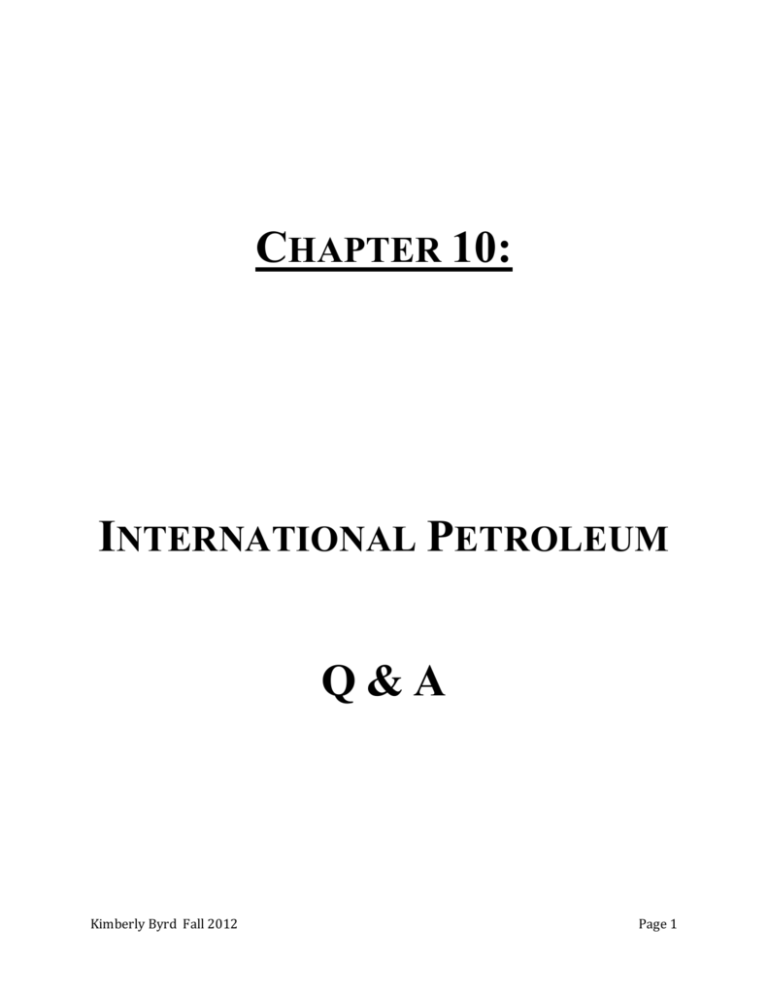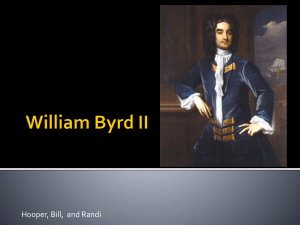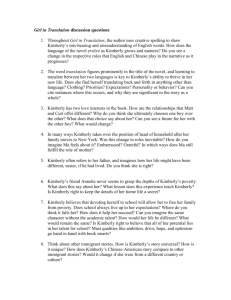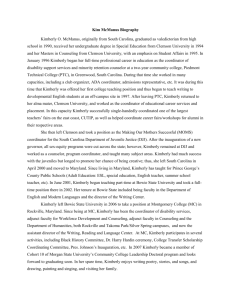paper
advertisement

CHAPTER 10: INTERNATIONAL PETROLEUM Q&A Kimberly Byrd Fall 2012 Page 1 INTRODUCTION The following questions are intended to guide future students through the basic concepts detailed in Chapter 10, International Petroleum. Review Questions: Questions 1 through 5 provide a review of the history of oil and its intersection with politics. Questions 6 through 10 review the law of oil extraction. Questions 11 through 15 review the nationalization of oil assets. Questions 16 through 20 review dispute resolution in the context of international oil agreements. Questions 21 through 25 review the intersection of human rights and the international oil industry. Questions for Critical Analysis: Questions 26 through 30 are discussion questions relating to the topics covered in Chapter 10, intended to deepen understanding of these topics. Kimberly Byrd Fall 2012 Page 2 REVIEW QUESTIONS 1. Of “The Seven Sisters” formed from the dissolution of Standard Oil, Chevron and Texaco merged to become Chevron-Texaco in 2001. Which other two “sisters” merged in 1999, becoming the world’s largest oil company? A. B. C. D. Exxon and Mobil Gulf and BP Royal Dutch Shell and Exxon BP and Royal Dutch Shell A. Exxon and Mobil In 1911, the Supreme Court determined that Standard Oil was a monopoly under the Sherman Anti-Trust Act, imposed fines on owner John D. Rockefeller and several others, and ordered that the company be divided into several geographically separate firms. Standard Oil Co. v. U.S., 221 U.S. 1 (1911). Thirty-four smaller companies were formed from the remnants of Standard Oil, three of which became part of the controlling group in the oil industry, known throughout most of the twentieth century as “The Seven Sisters,” which included Exxon, Mobil, Chevron, Royal Dutch Shell, British Petroleum (BP), Texaco, and Gulf Oil. Oil Supply II: Producers. On October 9, 2001, the shareholders of Chevron and Texaco separately approved the merger of the two companies. Texaco, Chevron Shareholder Approve Merger Deal, Houston Business Journal. However, the formation of this “supermajor” oil corporation did not surpass the size of the largest “supermajor” to be formed in recent years – that of Exxon Mobil Corp, which was formed in 1999 by the merger of Exxon and Mobil. Exxon-Mobil Merger Done, CNN Money. Kimberly Byrd Fall 2012 Page 3 2. OPEC Members include all of the following except A. Equador B. Iran C. Syria D. Venezuela C. Syria OPEC, the Organization of the Petroleum Exporting Countries, is a permanent intergovernmental organization that was formed in 1960 by Iraq, Iran, Kuwait, Venezuela, and Saudi Arabia. These five original members were joined over the years by Indonesia, Qatar, Libya, United Arab Emirates, Algeria, Gabon, Angola, Nigeria, and Ecuador. (Gabon’s membership was suspended in 1994; Indonesia’s membership was suspended in 2009.) OPEC rose to international prominence during the 1970s, as OPEC members exerted control over their own domestic oil industries and became major players in the world oil market. OPEC: Brief History. Kimberly Byrd Fall 2012 Page 4 3. What were the underlying reasons for the three oil shocks which took place during the 1970s and 1980s? A. All three oil shocks were the result of stringent trade restraints. B. All three oil shocks resulted from political instability in oil producing regions. C. The first two oil shocks were the result of domestic price controls, while the third oil shock was the result of a significant increase in imports. D. The first two oil shocks were the result of political instability in oil producing regions, while the third oil shock was the result of a combination of consumers deciding to choose fuels that offered more economic or environmental benefits and the deregulation of domestic oil prices in the U.S. D. The first two oil shocks were the result of political instability in oil producing regions, while the third oil shock was the result of a combination of consumers deciding to choose fuels that offered more economic or environmental benefits and the deregulation of domestic oil prices in the U.S. The first oil shock was largely the result of the Yom Kippur War, which created price instability in the world oil market. Following the United States declaration of support for Israel, OPEC declared an embargo on shipments of oil to the U.S. in retaliation which lasted until 1974. Wikipedia, 1973 Oil Crisis The second oil shock was a result of the political instability caused by the Iranian Revolution in the late 1970s and early 1980s. Wikipedia, History of Iran. A combination of factors converged to cause the third oil shock, including the decision of consumers to switch to fuels with more economic and environmental benefits than oil, higher oil prices worldwide, and the deregulation of domestic oil prices in the U.S. OPEC Share. The History of Oil. Kimberly Byrd Fall 2012 Page 5 4. Which event of the early 21st century resulted in a significant drop in the price of crude oil? A. B. C. D. September 11, 2001 The 2004 U.S. Presidential election The 2008 U.S. Presidential election The global financial crisis of September 2008 D. The global financial crisis of September 2008 Following the global financial crisis in September of 2008, oil prices suffered a staggering decline, hitting a low point of only $33 a barrel. U.N. Economic and Social Commission for Western Asia, The Impact of the Global Financial Crisis on the World Oil Market and Its Implications for the GCC Countries, 2009. Kimberly Byrd Fall 2012 Page 6 5. What policy concept is an attempt to prevent a situation in which a nation suffers from a disruption of oil supplies, accompanied by rapidly increasing oil prices, which results in threats to the economic and national security of the nation? A. Energy security B. Futures speculation C. Energy crisis D. Privatization for Sustainability A. Energy security Countries worldwide recognize the need to maintain a secure energy supply, by ensuring the uninterrupted availability of energy sources at an affordable price. While oil security is a cornerstone of most energy security policies, it has many aspects. Long-term energy security is generally concerned with making timely investments into the energy industry which coincide with economic development and environmental needs. Short-term energy security is primarily concerned with the ability of the energy system in a nation to react to fluctuations in supply and demand. IEA, Energy Security. Kimberly Byrd Fall 2012 Page 7 6. Prior to the trend toward nationalization of oil resources, how did private companies gain the right to drill for oil on landowners’ property? A. Purchased the property from the landowner B. Ad Hoc Contracts C. Concession Agreements D. Investment Agreements C. Concession Agreements Early agreements between oil-rich countries and private companies producing the oil typically provided compensation to the country in one or more of the following forms: - Stock in the company doing the exploration A bonus upon signing the agreement A royalty percentage on the oil produced The exclusive oil rights to a certain space Long terms that covered immense areas of land. Radon, The ABCs of Petroleum Contracts: License-Concession Agreements, Joint ventures, and Production-Sharing Agreements. Kimberly Byrd Fall 2012 Page 8 7. What are the primary legal mechanisms states now use in agreements granting operating rights to private petroleum investors? A. Concession agreements and Investment agreements B. Form Contracts, Ad Hoc Contracts, Hybrid Contracts C. Concession agreements and Licensure D. Production Sharing Agreements and Technical Service Contracts B. Form Contracts, Ad Hoc Contracts, Hybrid Contracts Form Contracts are detailed and rigid legal codes which may prescribe not only the conditions under which rights will be granted but also the form of any agreement between the host government and oil company. The government does not have much latitude in these agreements. They are commonly used in the United States, Canada, Australia, Latin America, and most Western European Countries. Ad Hoc Contracts authorize a state commission or nationally-owned oil company to negotiate and execute ad hoc agreements with individual foreign oil companies. Hybrid Contracts consist of a combination of legal codes prescribing the conditions under which rights will be granted, and ad hoc agreements. This approach permits some flexibility in the formulation of each transaction. Waelde, The Current Status of International Petroleum Investment: Regulating, Licensing, Taxing, and Contracting. Kimberly Byrd Fall 2012 Page 9 8. What are the forms an investment contract can take after it has been awarded? A. a concession or license B. a production sharing agreement or PSA C. a technical service contract or TSC D. all of the above D. all of the above Modern concession, or license, agreements often grant exclusive rights to an oil company to explore, develop, and export petroleum from a specified area for a period of time. Examples of countries using this type of agreement include Kuwait, Sudan, Angola, and Ecuador. Production-sharing agreements recognize that the contracting nation owns the petroleum resources, but allows foreign corporations to manage and operate the development of oil fields in an area. Countries using this form of investment contract include Indonesia, and others in central Asia. Radon, The ABCs of Petroleum Contracts: License-Concession Agreements, Joint ventures, and Production-Sharing Agreements. Technical service contracts are arrangements in which the contracting nation pays a flat fee or portion of production to an oil company in exchange for their provision of technical services and assistance in oil exploration, production, or development. (Bosselman, 408). Kimberly Byrd Fall 2012 Page 10 9. What judicial doctrine was developed to protect U.S. landowners from being taken advantage of through contracts with oil producing companies? A. Implied covenant of good faith B. Implied covenant to reasonably prudent performance C. Implied covenant to perform D. Implied covenant of obligation to develop B. Implied covenant of reasonably prudent performance In early concession agreements, it was a common practice of oil companies having international concession agreements to wait significant amounts of time before actually developing contracted land and exploring for oil, or would not develop the land at all and instead sell it for a higher price at a later time. This practice prevented landowners from collecting production royalties. To prevent oil companies from doing this, U.S. courts developed the judicial doctrine of the implied covenant to perform as a reasonably prudent operator and ended leases with no defined term. Bosselman, 379. Kimberly Byrd Fall 2012 Page 11 10.One of the primary differences between private oil production leases in the U.S. and internationally is: A. Length of term B. Who owns the oil below the land C. Both A and B are primary distinctions between U.S. and international oil leases D. Neither A nor B are primary differences between U.S. and international oil leases C. Both A and B are primary distinctions between U.S and international oil leases U.S. contracts are restricted to a fixed term, while international contracts may be for an undefined period of time. U.S. landowners also own the mineral rights to their property, and may separately contract away those rights while retaining ownership of the land; however, many foreign nations retain mineral rights in the crown or the government, and thus contracts for those rights are made between either the crown or the government and the oil company, rather than with the private owner of the land. Bosselman, 376 – 379. Kimberly Byrd Fall 2012 Page 12 11.Under a system where oil has been nationalized, what happens following a government’s seizure of oil fields or of the tools used to extract oil from private or international oil companies? A. the government negotiates with multinational oil companies for future oil extraction B. all oil operations in the country are ceased C. the oil fields are auctioned off to the highest bidder D. the oil fields or the extractive tools are placed under state control and the government owns and manages the oil in the name of the common good D. the oil fields or the extractive tools are placed under state control and the government owns and manages the oil in the name of the common good The process of nationalizing a country’s oil industry begins with the governmental seizure of oil fields and operations from private owners. Then, once all of these resources have been placed in government control, the state owns them and manages them for the people of the country. Brian Cabezas, Policy Implications of Nationalization of Oil and Natural Gas Industry in Latin America Kimberly Byrd Fall 2012 Page 13 12.How many countries have fully nationalized oil operations within their borders? A. 54 B. 23 C. 0 D. 17 Although there was a wave of countries who nationalized their oil industries in the 1970s, multinational corporations still hold a stake in most of these industries, albeit not a majority one. There are no countries who have, as yet, fully nationalized their oil industries. Brian Cabezas, Policy Implications of Nationalization of Oil and Natural Gas Industry in Latin America Kimberly Byrd Fall 2012 Page 14 13.As of 2004, what percentage of the world’s oil reserves were controlled by a governmental entity? A. 27% B. less than 15% C. more than 75% D. between 50% and 60% C. more than 75% As of 2004, between 77% and 90% of all the world’s oil reserves were controlled by some governmental entity. World Bank, A Citizen’s Guide to National Oil Companies. Kimberly Byrd Fall 2012 Page 15 14.TRUE OR FALSE: A nation’s status as a major world oil producer is a strong indicator of its likelihood to nationalize oil operations. A. True B. False B. False A study conducted of countries which nationalized their oil industries prior to 1970 demonstrated that only a small number of these nations were major oil producers. Therefore, no trend was found between the level of oil production in a nation and its decision to nationalize the industry. Kobrin, Diffusion as an Explanation of Oil Nationalization, 13. Kimberly Byrd Fall 2012 Page 16 15.Do the following statements describe multinational oil companies or nationalized oil companies? - Low-level corruption and mismanagement can result in a lack of bureaucratic accountability - Often unable to bear the risk of increased oil exploration - Susceptible to ideological shifts of managerial authority - Typically characterized by lower levels of efficiency than oil operations on the opposite end of the organizational spectrum A. multinational oil companies B. nationalized oil companies B. nationalized oil companies Contrasted to multinational oil corporations, individual nations are often unable to easily finance new industry infrastructure or increased exploration activities. Corrupt government officials often impede the operations of nationalized oil companies, and each political change in the governmental structure of a nation can have serious implications on the nation’s oil operations. Nationalized oil companies also tend to be much less efficient than privately owned operations, presumably due in part to aging equipment and lack of new resources to exploit. Wikipedia, Nationalization of Oil Supplies. Kimberly Byrd Fall 2012 Page 17 16.What are the primary barriers which prevent developing nations from litigating contractual disputes with multinational oil corporations in U.S. courts? A. Sovereign immunity B. Political question C. Act of State doctrine and Doctrine of Forum Non-Conveniens D. All of the above D. All of the above Sovereign immunity prevents suits in United States courts from being brought against foreign nations, unless one of five exceptions is met: waiver of immunity; action based upon commercial activity within the United States; actions involving rights in property taken in violation of international law where some property involved is present in the United States in connection with commercial activity; action for tortious personal or property damage or death; or action to enforce a maritime lien based on commercial activity. 28 U.S.C. §1330; §1605, §1607. Federal courts will not hear cases if the issue presented is a political question, i.e., the issue deals directly with something the Constitution dictates is the sole responsibility of another branch of the government. Cornell Legal Information Institute, Political Question Doctrine. Courts also refuse to hear cases due to the Act of State doctrine, which refers to the principle that “the courts of one country will not sit in judgment on the acts of the government of another, done within its own territory.” Underhill v. Hernandez (1897). The doctrine of Forum non conveniens provides that a court has discretion to dismiss a case if another forum exists which is better suited to hear the case in question. Courts consider several factors in this exercise of discretion, including: Kimberly Byrd Fall 2012 Page 18 the residence of the parties; the location of evidence and witnesses; public policy; the relative burdens on the court systems; the plaintiff’s choice of forum; and how changing the forum would affect each party’s case. Cornell Legal Information Institute, Forum Non Conveniens. Kimberly Byrd Fall 2012 Page 19 17.Which oil company successfully argued forum non-conveniens to get a suit under the ATCA dismissed to a foreign court system, where the company was subsequently held liable for $8 billion in damages to the people of Ecuador? A. Exxon B. BP C. Chevron-Texaco D. Royal Dutch Petroleum C. Chevron-Texaco In Jota v. Texaco (2nd Cir. 1998), plaintiffs alleged Texaco’s oil exploration activities in Ecuador produced extremely harmful effects on human health and the environment. Texaco successfully argued to the district court that the Ecuadorian courts were a more convenient forum to hear the case. The Second Circuit affirmed the decision, on the condition that Texaco submit to the jurisdiction of the Ecuadorian courts. See Aguinda v. Texaco (2d Cir. 2001). In the subsequent action filed in Ecuador, Texaco (by then Chevron-Texaco) was ordered to pay more than $8 billion to the Ecuadorian people for the damage caused to their health and environment. See L.A. Times, Chevron Ordered to Pay $8 Billion by Ecuador Court. ; See Ecuador Court Upholds $18 Billion Ruling Against Chevron. Although the judgment was entered against Texaco in February 2011, the company continues to fight the judgment in U.S. courts as of Fall 2012, and interest has increased the amount of judgment to nearly $19 billion. See Chevron Seeks Bank Records in Ecuador Environmental Suit and U.S. Judge Sits on Documents That Tie Chevron to Corruption in Ecuador, Says Amazon Defense Coalition. Kimberly Byrd Fall 2012 Page 20 18.What advantages does international arbitration afford oil companies in resolving disputes with developing nations? A. keeps information about the dispute out of the public record B. rules are determined by the parties, rather than any nation’s laws C. decreases likelihood a court will determine the company’s liability D. all of the above D. all of the above Businesses can gain several advantages from using international arbitration to resolve disputes. This process allows for a neutral decision-maker, confidential proceedings, procedural flexibility, and international enforceability of the awards. Further, it avoids the significant costs associated with defending or prosecuting multiple actions in different national court systems. Global Legal Group, The International Comparative Legal Guide to International Arbitration 2010. Kimberly Byrd Fall 2012 Page 21 19.In what stage of arbitration is the competence of a tribunal to hear the dispute often challenged, and the relevant treaty determined? A. damage assessment stage B. jurisdictional stage C. merits stage D. liability stage B. jurisdictional stage International arbitration generally proceeds in two stages: the jurisdictional stage, in which the jurisdiction of the relevant treaty is determined and the competence of a tribunal to hear the dispute is often challenged; and the merits stage, which includes both the determination of liability and then an assessment of damages. Peter D. Cameron, International Energy Investment Law: The Pursuit of Stability, 32 – 34. Kimberly Byrd Fall 2012 Page 22 20.Which form of international dispute resolution is limited to actions for breach of contract, may or may not allow the presentation of evidence, and has a decision-maker who is not bound by any statutory guidelines or enforceability principles? A. expert determination B. arbitration C. mediation D. resolution under the New York Convention A. expert determination In expert determination, the parties to a contract, and a dispute arising under that contract, agree to instruct an agreed upon expert to determine a solution to a particular issue in dispute. It is often used to settle only a narrow range of issues, typically technical valuation matters in the oil and gas industry. Expert Determination. Kimberly Byrd Fall 2012 Page 23 21.Many oil companies, governments, and non-governmental organizations have signed on to what code of conduct pledging to discourage police and private security forces from abusing people living near oil projects? A. Voluntary Principles on Security and Human Rights B. International Energy Agency’s Human Rights Principles C. Eurasian Energy Alliance’s Guidelines D. United Nations Commission on International Trade Law Rules A. Voluntary Principles on Security and Human Rights The Voluntary Principles on Security and Human Rights is a code of conduct in which participants pledge to discourage security forces, both public and private, from abusing the human rights of people living in the vicinity of oil projects. Signed in December 2000 by Chevron, Texaco, Conoco, Royal Dutch Petroleum, and BP, it has since been joined by governments, other companies, and non-governmental organizations. It provides guidance to companies for ensuring respect for human rights in the protection of their facilities and premises. U.S. Dept. of State, Voluntary Principles on Security and Human Rights. Kimberly Byrd Fall 2012 Page 24 22.From 1789 to 1980, in how many cases did the ATCA provide subject matter jurisdiction to federal courts? A. 68,472 B. 27 C. 395 D. 1 D. 1 The First Congress passed the ATCA as part of the Judiciary Act of 1789, presumably motivated by a concern that those who violated international law could draw the United States into foreign entanglements. From that time until 1980, it provided jurisdiction to federal courts in only one case. Sosa v. Alvarez-Machain et. al. Since 1980, nearly 200 cases have used the ATCA to bring claims of international human rights violations – 155 of which were brought against corporations. The Alien Tort Statute, Federalism, and the Next Wave of Transnational Litigation, The Georgetown Law Journal. Kimberly Byrd Fall 2012 Page 25 23.Can an American citizen utilize the ATCA as a basis for federal jurisdiction over a claim? A. No B. Yes A. No The ATCA (28 U.S.C. §1350): “Alien’s action for tort: The district courts shall have original jurisdiction of any civil action by an alien for a tort only, committed in violation of the law of nations or a treaty of the United States.” (emphasis added) By its plain language, the statute provides jurisdiction for only those actions brought by aliens, or non-citizens of the United States. Therefore, an American citizen could not use this statute as a basis for jurisdiction in federal courts. Kimberly Byrd Fall 2012 Page 26 24.What violations of the law of nations did the Supreme Court determine in Sosa could be claimed under the ATCA? A. war crimes, crimes against humanity, and other claims where the guilty party is considered an enemy of all mankind B. torture and war crimes C. those claims based on norms of international law that are accepted by the civilized world and defined with specificity comparable to that of piracy D. violation of safe conducts, piracy, and invasion of the rights of ambassadors C. those claims based on norms of international law that are accepted by the civilized world and defined with specificity comparable to that of piracy In Sosa, the Supreme Court held that future claims brought under the ATCA should be based on international norms that are “accepted by the civilized world” and “defined with a specificity comparable” to that of the violation of safe conducts, the infringement of the rights of ambassadors, and piracy at the time the ATCA was enacted. Kimberly Byrd Fall 2012 Page 27 25.Can a corporation be held liable for a tort claim brought under the ATCA? A. Yes B. No C. Maybe C. Maybe In Kiobel v. Royal Dutch Petroleum Inc., the Second Circuit held that a corporation could not be held liable under the ATCA for the claims brought by the Nigerian plaintiffs, which included extrajudicial killing; crimes against humanity; torture or cruel, inhuman and degrading treatment; arbitrary arrest and detention; violation of the rights to life, liberty, security, and association; forced exile; and property destruction. This created a split among the circuits, as the Eleventh Circuit previously held a corporation liable for aiding and abetting extrajudicial killings in Romero v. Drummond Co., Inc. In July 2011, the D.C. Circuit rejected the reasoning of the Second Circuit, following the Eleventh Circuit’s determination that corporations were proper defendants under the ATCA. Doe VIII v. Exxon Mobil Corp. The Supreme Court granted certiorari in Kiobel on October 17, 2011 to resolve the disagreement on the question of corporate liability under the ATCA. Supreme Court Grants Cert. in Kiobel and Mohamad. Following February 2012 oral arguments on this issue, the Court announced a decision would be postponed on corporate liability, and scheduled oral arguments on the question of the extraterritorial application of the ATCA for October 2012. News Post: ATS Decision Postponed. A decision on both questions is, at the time of this writing, still forthcoming. Kimberly Byrd Fall 2012 Page 28 QUESTIONS FOR CRITICAL ANALYSIS 26.Should the theory which suggests that world oil production will run out eventually, or the theory of peak oil, influence future U.S. policy regarding the use of petroleum, or is it simply a myth which should be disregarded as propaganda designed to increase the price of oil and profits of producers worldwide? Kimberly Byrd Fall 2012 Page 29 27.Which procedure for awarding investment agreements is most advantageous for the people of a nation? How is this procedure more advantageous than the others which are commonly used? Kimberly Byrd Fall 2012 Page 30 28.Considering the preceding emergence of the theory of peak oil and coinciding fluctuations of oil prices and availability, how much do you think these concerns influenced the decision of many countries to nationalize their oil operations? Do you think these concerns may have outweighed even the stated influences, namely political, economic, and environmental concerns, of those nations who did make the decision to nationalize? Kimberly Byrd Fall 2012 Page 31 29.Judicial estoppel is a doctrine which is intended to protect the integrity of the courts from intentional contradiction. The elements a party must prove for judicial estoppel to be applied are as follows: (1) a party’s position in a case or controversy must clearly conflict with a position taken in an earlier matter; (2) that party must have persuaded a court (or presumably another tribunal) to have accepted its earlier position such that the acceptance of an inconsistent position in the later proceeding creates the perception that the party must have misled the either the first or second court; and (3) the party derives an unfair advantage from the change in position or imposes an unfair detriment on the opposing party if the first party is not estopped. In the long-running dispute between Chevron and Ecuador, do you think that Chevron should be judicially estopped from arguing that the Equadorian judgment levied against the company was obtained after an unfair trial following its successful argument of forum non-conveniens to get the Ecuadorian claimants’ U.S. action dismissed to Ecuadorian courts, where Chevron then claimed it could get a fair trial? Kimberly Byrd Fall 2012 Page 32 30.If the Supreme Court decides in Kiobel that corporations may not be held liable for tort claims brought against them under the ATCA or that extraterritorial torts with no connection to the United States may not be made subject of claims under the ATCA, then considering the limitations of existing law in imposing liability for tort actions against multinational corporations operating in developing nations what existing system should be used to deter corporations from violations of human rights arising from their operations? If no existing system would be sufficient to do so, what system should be put in place to deter these actions? Kimberly Byrd Fall 2012 Page 33





